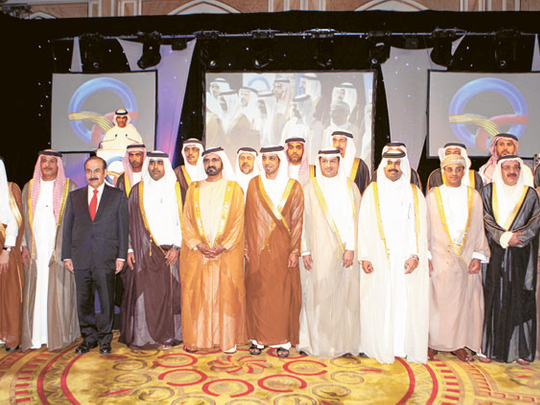
Abu Dhabi: His Highness Shaikh Mohammad Bin Rashid Al Maktoum, Vice-President and Prime Minister of the UAE and Ruler of Dubai, inaugurated the second phase of the GCC Grid Interconnection Project, which could save up to Dh18.4 billion in electricity costs for participating countries.
"The project aims to connect the electricity grids in GCC countries to one another. This would provide a platform for energy trade and exchange, while improving the reliability of existing energy systems and lowering electricity reserve requirements on GCC countries," Shaikh Mohammad said during the inauguration ceremony in Abu Dhabi.
The strategic and economic integration of the GCC region is the key to the well-being of its citizens and it also represents the shared vision of GCC leaders, he added.
Growing demand
Minister of Energy Mohammad Bin Dha'en Al Hamili said that the UAE is working on increasing its electrical power output to supply the growing demand for electrical power.
The total cost of the electricity grid exceeds Dh5 billion of which the UAE's contribution is about Dh800 million. The grid's existing members are Saudi Arabia, the UAE, Kuwait, Bahrain and Qatar.
Eisa Al Kawari, chairman of the GCC Interconnection Authority (GCCIA) said Oman is expected to join the grid within the next two years.
He also said Saudi Arabia has undertaken a study with the World Bank about connecting the grid to Europe.
Saudi Arabia can give and receive 1,200 megawatts, the UAE 900 megawatts and Qatar 750 megawatts. Nations are now negotiating to sell power to each other starting from next year and will be penalized in future if they don't maintain a minimum reserve level to support their neighbours in an emergency, said Al Kawari.
GCCIA is mandated to implement the project, as well as to manage its maintenance and network operation, while playing a key role in energy trade in the region.
Al Kawari also presented an overview of the different stages of the project, which included extending electrical lines above the ground, along with an underwater cable in the Arabian Gulf.
The network has also been used to extend fibre optic lines in order to strengthen information technology and networks infrastructure in the GCC countries and provide investment opportunities for companies operating in the telecommunications sector.
The inaugural ceremony of linking electricity between Al Sila station in the UAE and Salwa station in Saudi Arabia was also attended by Shaikh Maktoum Bin Mohammad Bin Rashid Al Maktoum, Deputy Ruler of Dubai, and Shaikh Mansour Bin Zayed Al Nahyan, Deputy Prime Minister and Minister of Presidential Affairs, Shaikh Hamed Bin Zayed Al Nahyan, Chairman of the Abu Dhabi Crown Prince's Court, Shaikh Nahyan Bin Mubarak Al Nahyan, Minister of Higher Education and Scientific Research, and senior officials.
After the National Anthem Shaikh Mohammad pressed the button, officially launching the second phase of the project.











